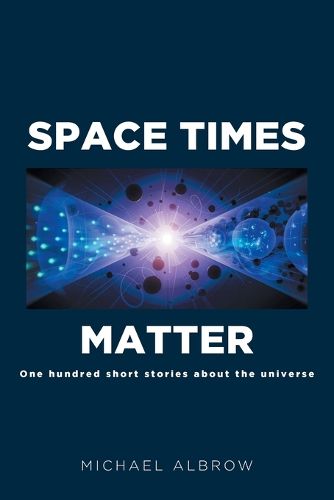Readings Newsletter
Become a Readings Member to make your shopping experience even easier.
Sign in or sign up for free!
You’re not far away from qualifying for FREE standard shipping within Australia
You’ve qualified for FREE standard shipping within Australia
The cart is loading…






This title is printed to order. This book may have been self-published. If so, we cannot guarantee the quality of the content. In the main most books will have gone through the editing process however some may not. We therefore suggest that you be aware of this before ordering this book. If in doubt check either the author or publisher’s details as we are unable to accept any returns unless they are faulty. Please contact us if you have any questions.
Do you wonder how the sun and stars work and what are subatomic particles ? Have you heard of dark matter and dark energy but don't know what they are, neither do physicists, so join the club. What is space, what is time, and is it forever ? How come the universe is just right for life, and are there other universes? Welcome to the frontiers of knowledge!
In this collection of one hundred short science stories, Albrow addresses these and many other fascinating questions. The pieces are meant to be self-contained, so there is some repetition; you are invited to browse, read one today and another tomorrow, in no particular order. These stories could be used by a science teacher to inspire a class to dig deeper. No math is required; there are (almost) no equations. Some stories about space and time include Albrow's original ideas. The collection concludes with eighteen original science poems.
Michael Albrow has been doing research in subatomic particle physics for sixty years since graduating from Birmingham University (United Kingdom) in 1964. A former professor at Stockholm University, he is now scientist emeritus at Fermilab near Chicago and is a fellow of the Institute of Physics and the Amercan Physical Society for outreach and education. Albrow was on the teams that discovered the heaviest known particle, the top quark, at Fermilab, and the Higgs Boson (the "God particle") at CERN in Geneva.
$9.00 standard shipping within Australia
FREE standard shipping within Australia for orders over $100.00
Express & International shipping calculated at checkout
This title is printed to order. This book may have been self-published. If so, we cannot guarantee the quality of the content. In the main most books will have gone through the editing process however some may not. We therefore suggest that you be aware of this before ordering this book. If in doubt check either the author or publisher’s details as we are unable to accept any returns unless they are faulty. Please contact us if you have any questions.
Do you wonder how the sun and stars work and what are subatomic particles ? Have you heard of dark matter and dark energy but don't know what they are, neither do physicists, so join the club. What is space, what is time, and is it forever ? How come the universe is just right for life, and are there other universes? Welcome to the frontiers of knowledge!
In this collection of one hundred short science stories, Albrow addresses these and many other fascinating questions. The pieces are meant to be self-contained, so there is some repetition; you are invited to browse, read one today and another tomorrow, in no particular order. These stories could be used by a science teacher to inspire a class to dig deeper. No math is required; there are (almost) no equations. Some stories about space and time include Albrow's original ideas. The collection concludes with eighteen original science poems.
Michael Albrow has been doing research in subatomic particle physics for sixty years since graduating from Birmingham University (United Kingdom) in 1964. A former professor at Stockholm University, he is now scientist emeritus at Fermilab near Chicago and is a fellow of the Institute of Physics and the Amercan Physical Society for outreach and education. Albrow was on the teams that discovered the heaviest known particle, the top quark, at Fermilab, and the Higgs Boson (the "God particle") at CERN in Geneva.